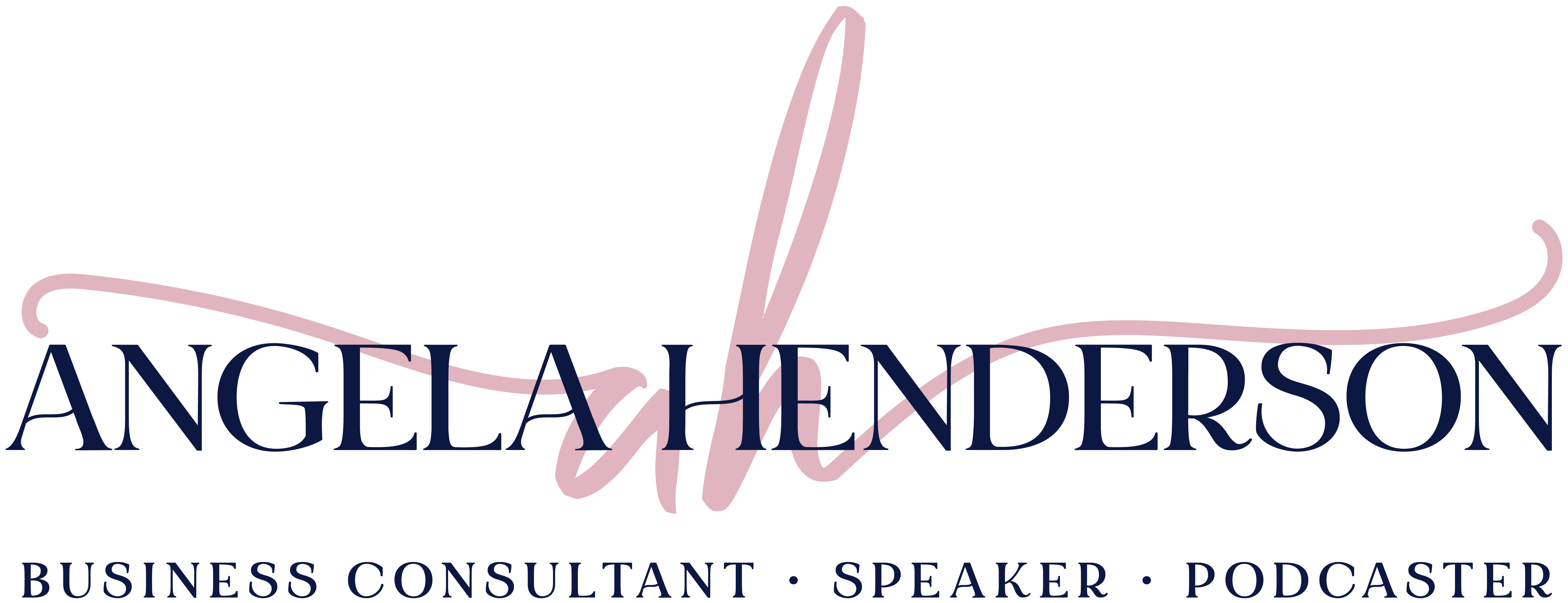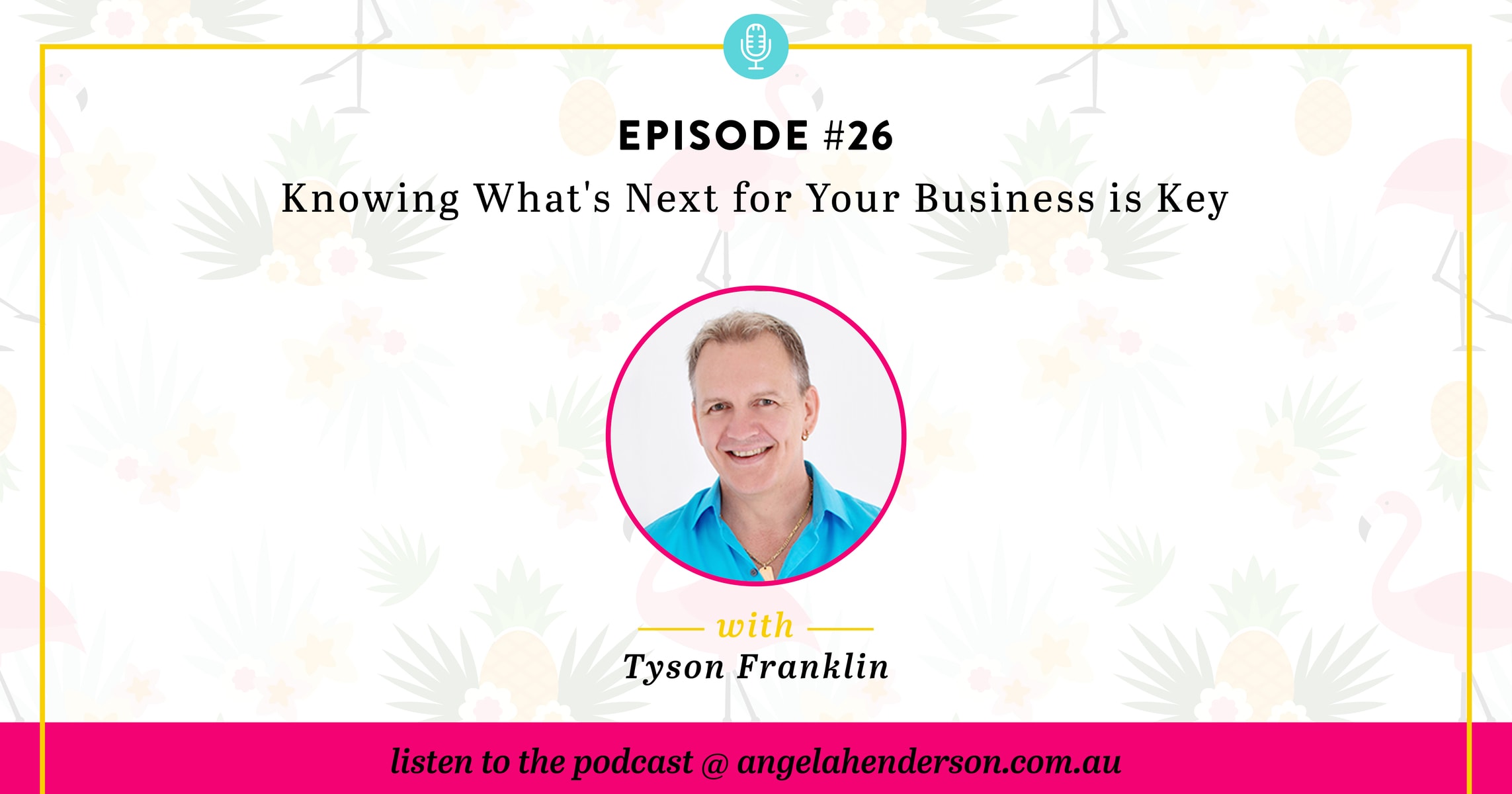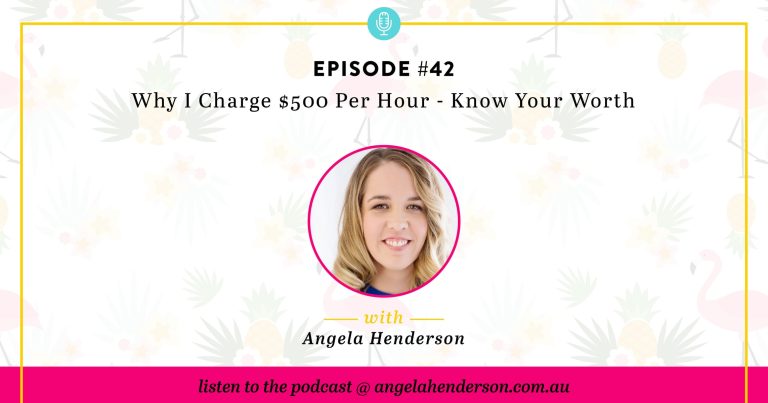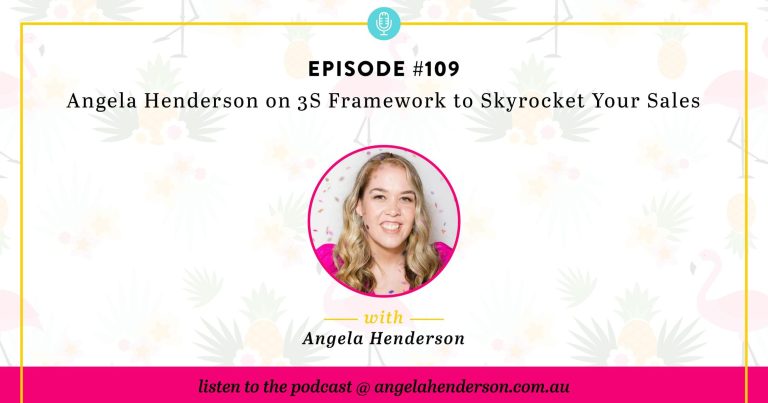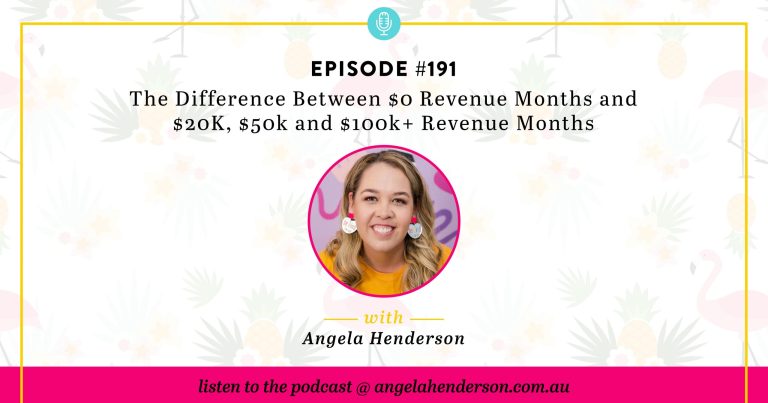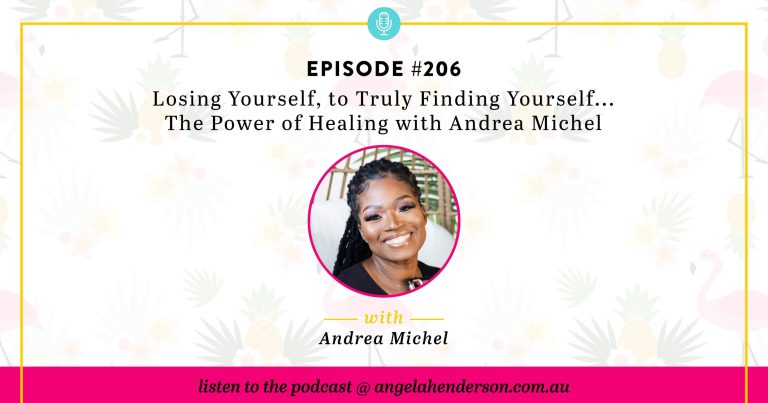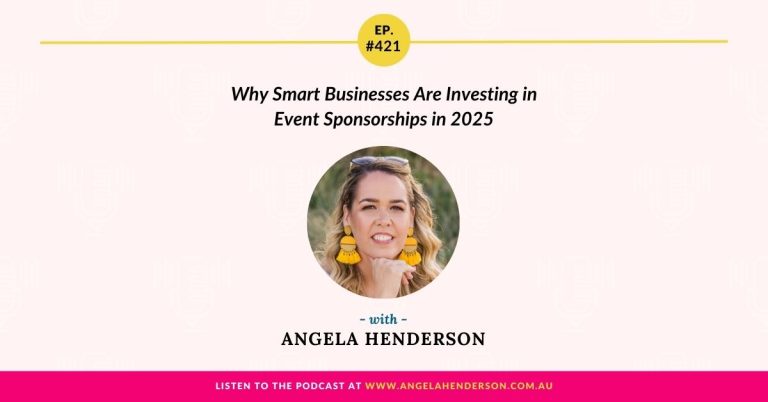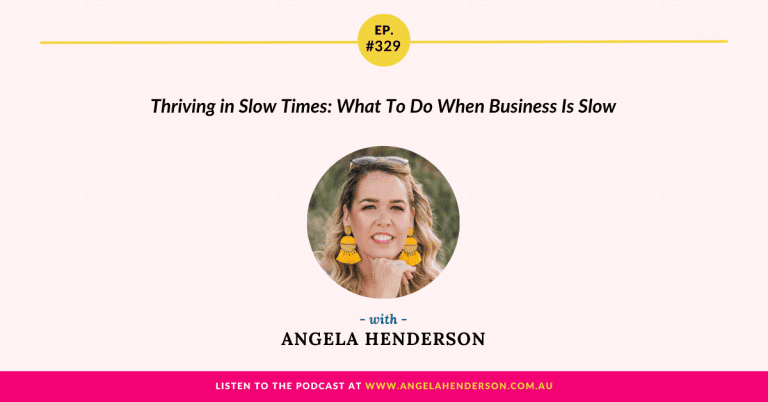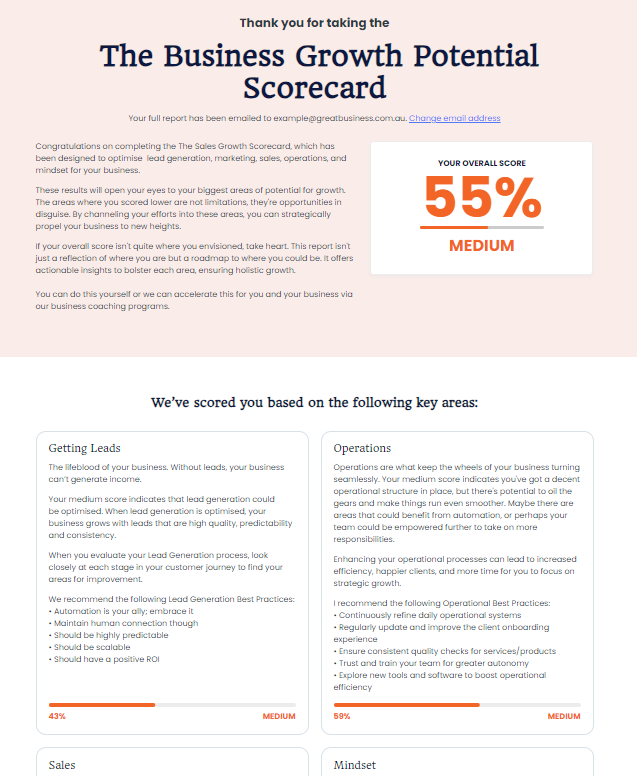In this episode, Tyson Franklin, author, speaker, podcaster, and creator of 365 Hour Mental & Physical Challenge, shares his expertise on being successful by knowing what’s next for your business. He gives valuable tips to individuals and businesses who want to start planning. He also guides us through the ins and outs of setting up systems and foundations to grow your business, the risks you face when you don’t plan, and how you can learn from your mistakes.
Important Links Mentioned in the Show:
Angela Henderson Active Business Facebook Group
Angela Henderson Facebook Business Page
Prefer to read Knowing What’s Next for Your Business is Key? Here’s the transcript:
ANGELA:
You’re listening to the Business and Life Conversations podcast, with Angela Henderson, episode 26.
Hey there, you’re listening to the Business and Life Conversations podcast, my name is Angela Henderson, and on this show we talk about improving your business, life or both. By having amazing and rich conversations with brilliant guests. Who will inspire you and who will give you tips and tricks, to help you grow both in life and in business.
Hey there, amazing humans! I’m your host, Angela and welcome to another episode of Business and Life Conversations. I hope your day is filled with all levels of awesomeness and that you’re ready to listen to another amazing episode of the Business and Life Conversations podcast.
Today I’m thrilled to be bringing on another amazing man to the podcast who has sold more than 20 podiatry businesses, won the Queensland Telstra Business Award and wakes up every day filled with an all high level of enthusiasm. Today we’re going to be talking about why knowing what’s next for your business and life is key to overall success. Tyson’s a huge advocate for thinking big, but at the same time being mindful that regardless of how big you think it’s important for your thinking to be guided in the right direction. So buckle in for brilliant show, because we’re ready to rock and roll. Welcome to the show. Tyson.
TYSON:
How you doing? This is fun. This is going to be fun. I can already tell from your energy that we are going to have a really good conversation.
ANGELA:
I am filled with energy. Sometimes I talk too quickly. That has been some feedback from the podcast, but listen, I am who I am. I love a good energy. I love a good chat. So thank you so much for being on board today.
TYSON:
No, no, this is great. I’m looking forward to it. So, where are we going to start?
ANGELA:
Where are we going to start? Well, listen, I always like to start with a fun fact with any of my guests, because I think it’s important that the audience gets to know you on a little bit of a human level before we jump into your level of expertise. So my question to you today is, what is the scariest thing you’ve ever done before?
TYSON:
Scariest thing I’ve ever done or the scariest thing I’ve ever had happened to me, was to be hit by a shark while I was on my surfboard.
ANGELA:
Oh no! No, no, no, no…
TYSON:
That was pretty scary. Came up underneath and just went bang and knocked me off. That was probably the last time I ever surfed because I’d had two run-ins before that and I thought, well, it will never happen a third time, so I felt like I’m a shark magnet.
ANGELA:
Oh my goodness, I can’t even. My heart is racing. I do not deal well with your guys’ Australian wildlife over here. I’ll give you that tip. You’ve had three encounters with sharks in total?
TYSON:
Yeah. Three.
ANGELA:
No that… No, I think your lucks run out my friend, you need..
TYSON:
That’s what I reckon. I now only swim when there’s a lot of people around me, because I tend to attract sharks.
ANGELA:
Did you know what type of shark it was? Did you see?
TYSON:
A big one. Well, all I know it was big, if you’ve ever felt a shark before..
ANGELA:
No.
TYSON:
They’re like sandpaper, so all I can remember is that as it hit me and I’ve slid off and it sort of slid passed my side and my arm’s gone over the top of, it scraped me as it went through… And when they say your life flashes before you, it does. Because the whole time I was there, I was thinking, “What am I doing out here? I’m not even really a good surfer, I don’t know why I keep coming back”… And all I can remember doing is reaching down, flicking my leg rope off, I don’t know why, I put my head down … I was stuck in a rip, that was what was the problem, I was in a rip and I couldn’t get back in…
ANGELA:
Oh no, Tyson.
TYSON:
I was trying to get back in for about, maybe, half an hour and then all of a sudden, I flicked my leg rope off and I reckon within 90 seconds I was back on the beach. If I was doing Olympic trials, I would’ve…
ANGELA:
You would have been the winner for sure that day!
TYSON:
And I don’t think I stopped swimming until I was probably ten metres up onto the sand. I still just dragged my body up and yeah, so that was scary. That was really…
ANGELA:
Yes, I would actually say that that ticks all boxes for levels of scariness there, Tyson, and I am glad to know that nothing happened. That’s a positive thing.
TYSON:
Ah yeah, I know, and the other two times… they were just close.
ANGELA:
Close!
TYSON:
But not that close.
ANGELA:
Okay, well, I would never have even thought that a shark was like sandpaper. Alright, we’re off track here, but anyways I could talk you. Now you’ll have to tell me when we see each other at, We Are Podcast in October. We’ll have some good conversations that we’ll continue on then.
TYSON:
Yes.
ANGELA:
All right so surfing obviously you used to love to surf clearly. Also been attacked almost by three sharks but tell us a little bit more now about your business journey. Where did you start? Where did you go and where are you today?
TYSON:
When I finished school I was going to be an art teacher. That was my thinking. “I’m gonna be an art teacher,” and then my brother came up to me who was doing dentistry and he said, “So what are you gonna do when you finish school?” I said, “I’m gonna do art.” And he goes, “Oh my god.” He goes, “I’m gonna a successful rich dentist one day and you’re gonna be a poor artist.”
ANGELA:
Yep.
TYSON:
And he said, “I’ll have a Porsche. You’ll have a Volkswagen. Eventually you’ll be hitting me up for money to buy paint and we’ll stop talking. We may as well stop talking now.” So I thought about it. I went to my art teacher and I said, “So what sort of car do you drive? And she said, “Volkswagen why?” I went..
ANGELA:
No.
TYSON:
And I told her what my brother said and he went, “Look, you’re good at art and you like art but you don’t actually have to do it as a living. You could always do something, do that as a hobby. And go and do something else.” She said, “You know you’re smart enough to go and do anything.” So I sat down and my brother said, “If you do anything in the medical field you’ll never be unemployed and you’ll always make above average money.”
Okay so I sat down and I went, “Right, I wanna do something where no one ever dies and everything can wait till tomorrow.”
ANGELA:
I like your thinking.
TYSON:
There was podiatry, optometry, radiography. They were sort of the ones that fitted and I said, “And I wanna work for myself.” So we sort of narrowed it down to podiatry. That’s how I came up with it. So I then had to go back, repeat grade 12 and I had to drop art, physical education, manual arts and all that. I had to do chemistry, biology, physics and I also had to convince the principal of someone who had been as lazy as hell all through school that I was actually gonna come back and apply myself and take on five new subjects that I’ve never studied before and learn it all in one year.
ANGELA:
Wow, well that’s a challenge. And what did he say? Was he supportive or hesitant?
TYSON:
He was really hoping I wasn’t gonna come back ’cause he said he was looking forward to me leaving. But I was good football player at the time so I think they didn’t mind me coming back and playing football for another year. So I did that, got through, did well. Got into uni. I enjoyed podiatry. I wouldn’t say, “Did I love it?” No, I enjoyed it but towards the end of my final year they, we had a business subject and so I had to do a business plan on how I’d run a business and the first book I ever read was Noel Whittaker’s Making Money Made Simple.
ANGELA:
Okay.
TYSON:
And I went, “Wow, I’ve never thought about the business world before. This is really interesting.” So, I put my head down and really worked on this business plan and I was the first person in the university including the business students who ever got a 100% for this subject.
ANGELA:
Well done.
TYSON:
And someone from the business school said, “Have you ever thought about doing business instead of podiatry and I went, “Never thought about it before.” So when I graduated I enrolled for a business degree at Griffith Uni. Only did the first six months and it was like the theory’s terrible. I just wanna get in there and open up a business. So I opened up my own podiatry clinic pretty much as soon as I graduated. Knew nothing, learnt by trial and error. Lost a lot of money, made heaps of mistakes, employed the wrong people. Did everything you could possibly do wrong, I did it. And then things just got better. As time went on you just learn new skills and you learn from your mistakes and you read more.
I ended up moving from the Gold Coast to Cairns and it all changed when I went to this one weekend seminar. And they were talking about just different business ideas and they were saying the people that have the biggest hang-up about money is usually the person that owns the business. Not your clients or customers. And you only had to be paid what your worth but right at the end he said, “You’ve got to have … yeah what have you made this year, what’s your goal for next year?” So we all had to write it down. I did that. Then he said, “Okay now what do you need to do to achieve your goal?” So we’re all writing down the things that we have to do and I’m going, “Okay yeah that’s really cool.” He said, “Okay now what I want you to do is put a zero on the end of it. That is your real goal.” And you hear whole room go, “Aww”.
ANGELA:
Wow.
TYSON:
He goes,” Now I know you all think that’s ridiculous.” He said, “But if you could do it, what do you think you would need to do differently to what you already wrote down?” So we started writing a couple of things and he says, “Put your hand up if you think this is a possibility.” Not one person put their hand up.
ANGELA:
Oh no.
TYSON:
He said, “Okay let’s say we’ve got your wife, your children, your parents. Every person you’ve ever cared about and loved in a room and we will kill them if in 12 months you have not achieved that goal. Who here would find a way to make that money to save their family?” And every person put their hand up and something went off in my head that day and the turnover of my business within in 3 months doubled. Six months later..
ANGELA:
Well done.
TYSON:
It doubled again and my mind just exploded with ideas and way that I could work, to me..
ANGELA:
At that stage did you, it was just your one podiatry office? Or had you already started to expand? How did that look?
TYSON:
Oh okay so when I was on the Gold Coast I had one in Southport and then I’d set up a couple of satellite clinics that I used to sort of just rotate between. I had another person working with me. But it was just a really dodgy setup. They were just run really bad. I still made money but they just weren’t run very well. Mainly because I didn’t know anything about business and I hadn’t worked for anybody else to even learn anything. I was purely just learning on the go. Learning on the run.
When I moved to Cairns. When I first set up there I had just one main clinic and had multiple just smaller ones like around the place we used to drive out to. After I went to this seminar, this weekend workshop and I realised, “Well I can do anything.” It was then that I started expanding. So at one stage I had five clinics. 1800 kilometres apart so when you start doing that, that’s when I started learning about systems.
ANGELA:
I was just about to ask that. How much of this was a success because of the systems you have in place? Because so many people try to explain or scale very, very quickly or franchise out or open multiple shops but yet their foundations … I’m a huge foundations person. If anyone has been listening to me for a while. You’ll know I talk about foundations all the time. What did you have to do system-wise to get everything talking with each other and working collaboratively?
TYSON:
Yeah the systems were what built my business because at one stage what I did was I had my clinic in Cairns and I went, “I’m going to set up another business in Mackay, which was 800 kilometres away and now I did it for two reasons. One was because if it failed nobody in Cairns would know.
ANGELA:
Yep.
TYSON:
Won’t talk about that again. But the other reasons I wanted to know was my business gonna be successful because I had great systems in place? So I developed things that actually worked in great marketing plans and it was far enough away that it couldn’t draw on the past success of my other business. So I know some people that have had one business and it’s great. So they go and set up another one in another town and it goes really good but the other town already knows about this business. So they sort of draw upon it, whereas when they then take that business and go and put it say from Brisbane they go and put it in Perth it fails because nobody in Perth even know who they are. I set it up in Mackay because I didn’t want it to feed off my reputation.
ANGELA:
Yes.
TYSON:
So, when I set it up. Put the systems in place. Simplified a lot of things and what took me eight years to do in Cairns I did in 12 months in Mackay.
ANGELA:
Wow. That’s pretty legendary.
TYSON:
Yeah. It boomed. So I went, “Oh my god. I think I’m on to something here.” So then I came back and said, “I wonder if I could franchise this.” So then I had a couple of podiatrists approach me so we set up two franchises and they both went really well. And that’s when I started really putting systems together. I went and met up with a franchise company. Said, “I want to franchise my podiatry clinic. No one’s ever done it before.” And they really then made me put systems… so even though I had a lot of systems together which worked. They then really made me..
ANGELA:
It would be like next level systems.
TYSON:
Next level systems. I mean it was taking systems to, I mean, when you decide to franchise and there’s a lot of legal requirements as well when you franchise. It takes systems to … you think as high as you can go with it and then just times it by three. It is incredible but I learnt so much through that process that I then decided to open up another clinic myself. Just repeated the process. Once again it started making money and anyway I did this for a couple of years. About five years and all of a sudden I, you know when you go to sleep at night and you’re thinking, “I’m doing the wrong thing.”
ANGELA:
It has happened.
TYSON:
Yeah it’s not that I don’t like the idea of franchising. I think it’s great but what I’ve realised is when you’re dealing with healthcare you’re not making a hamburger.
ANGELA:
Yeah, yes. That is true.
TYSON:
Every person that walks in is different. Every problem is different. Every podiatrist that owns a business has different strengths, weaknesses. You cannot make them all the same. So, all of a sudden I started getting, feeling sick in the stomach that I’m trying to make all these podiatry clinics be the same and it just didn’t sit well with me. So I contacted them and said I wanna cancel the franchise agreement. I said, “You can still have the business. You can keep all the money. I don’t want my six percent share of it anymore. I don’t wanna have to be telling you what to do.” And they were like, they thought it I was great.
ANGELA:
Yeah well it’s a win for them but like you said though. Again as a mental health clinician or exactly mental health clinician myself you’re 100% right. In that particular instance you can’t cooker cutter, can you?
TYSON:
No.
ANGELA:
It has to be tailored for like you said almost each demographic, each geographic and then not to mention from all the medical stuff, legally you also have to take into consideration if they’re in a different state and how you’re billing it. Etcetera. So yeah so you went from a scalability point of view it wasn’t a matter of just like, “Here’s the manual. Rock and roll. Have a good day.” It would have been a lot of effort. Emotionally and physically I’m assuming to try and get each of those franchised working the way you needed it to work.
TYSON:
It was hard, it was really hard because I had one person who was like a really, really good runner and he wanted to put in treadmills and video cameras from all these different angles and do all these running assessments and then had somebody else who was slightly alternative. He had that sort of a bit more of a greeny and they wanted to come at it as a bit more of a holistic approach. And I’m thinking, “Well hang on, I’m holding them back. I’m stopping them from actually really running with their strengths and making their business different to the guy down the road.”
ANGELA:
So then what happened? So you ended up then, did you sell all the podiatry at that stage and then pivot it? Then what happened?
TYSON:
I sold them off. Yeah so it’s the franchise ones we let go. The other ones I ended up selling off and then I had other clinics around the place. I ended up just amalgamating everything until I decided I’m gonna have one clinic in Cairns and it’s gonna be like a mega-clinic. It’s gonna be big. So it ended up by the time I’d finished with it was about 360 square metres, I think. So it was pretty big.
ANGELA:
Wow.
TYSON:
And it had everything. It was just fantastic and then one of the guys from the Shark Tank has been going around buying up podiatry businesses and they approached me and said, “Do you wanna sell?” And I said, “Yeah okay.” Well actually I said, “No. I don’t wanna sell.” I said, “Unless you offer me an obscene amount of money.” So they offered me an obscene amount of money, so I sold it.
ANGELA:
You’re like, “All right. Looks like there’s my … I’m pivoting and this is what, I’m going somewhere new now.”
TYSON:
Yeah so I still own 20% of the business. They came in, changed all my systems. It’s not going anywhere near as good as it used to. So I reckon if they had to just followed my systems then all their podiatry clinics would be making probably double what they’re making but instead they introduced their own systems.
ANGELA:
Sometimes people have to learn. They just have to learn the hard way.
TYSON:
They’re trying to cookie cutter. Like you said they’re trying to use the cookie cutter method with 75 podiatry clinics across Australia and not taking into account, like you said, there’s different people in different areas and they’ve all got to be treated differently.
ANGELA:
Yes so now let me ask you this. At this stage ’cause again the whole essence of the conversation today is really knowing what’s next for your business and or life, or combined. So at that stage when the Shark Tank guy had contacted you and reached out to you. Did you know what was next for you in business and life? Or were you kind of winging it?
TYSON:
No.
ANGELA:
Can you talk me through a little bit about that ’cause I guess that’s really what I wanna hone in on for this particular episode is, letting people know ’cause I actually know a few people? I was just at speaking conference over the weekend a few of them said, “Ange, you know my kids are getting older. I still want the business but I don’t wanna be in the business. I wanna be able to create the systems necessary so that my husband and I can go travel to Italy or we can do X, Y and Z.” So they’re really focusing on that. So that’s why again it’s even great that you’re on here because there’s a lot of people who have been talking about this transition stage you could say. So, I’d love to know what were you planning? What did you need to know? What was gonna happen for your business and life? What plans did you have in place?
TYSON:
Okay, well when I sold my business I had not actually worked in my business for two years prior to selling it. That’s what made it so valuable. So when they bought my business it wasn’t relying on me actually working as a podiatrist. I’d set systems in place that the business could run at about 95% without me having to walk in there.
ANGELA:
Can I also ask were you, I’m assuming you had removed yourself from a personal branding perspective also, right? Your name wasn’t needed in order for the business to succeed. Is that right?
TYSON:
Every bit of advertising and marketing I ever did from the time I started my business in Cairns I only ever promoted the practice. I never promoted myself. I never promoted a podiatrist that worked for me because as far as I’m concerned they could leave and go and set up down the road if I wanted to. So I tell everyone they’re the best podiatrists in the world and then they set up down the road and I’m telling them, “Oh, no actually there the second best. I’d promote my business is the best podiatry clinic in the world. That will never change.
ANGELA:
That will never change and I think it’s just important for those that are listening because a lot of people get hung up on, “Am I the face behind the brand.” And Chris Ducker a friend of mine over in the U.K. A big entrepreneur, his new book that he just brought out talks a lot about, “If you plan on selling your business you really need to think from the beginning about, do you wanna be the brand and what is that gonna add value if you ever choose to leave? Are you gonna be the person running it? You’re not the face of the brand.” So again this is just a prime example of Tyson saying to us is saying to us that he was never the face of the brand. It was always, he was separated from that element of that.
TYSON:
Yeah even though everybody in Cairns knew I was behind the brand.
ANGELA:
Yes.
TYSON:
It wasn’t me that they spoke about. People would say … like even now. Like I sold my business two years ago and it was called Proarch Podiatry. I went and bought a pair of shoes the other day from a young guy, a great bloke, about 21 in the shoe shop and I’d never been in there before. I was buying these shoes. He saw me taking out inserts out of my other shoes and put them in there and I said, “Oh yeah I used to do podiatry.” He goes, “Oh right.” And he said, “Oh whereabouts?” Said I used to be called Proarch Podiatry. He goes, “Oh yeah I know you guys. I had gone there.”
ANGELA:
Oh wow. That’s awesome.
TYSON:
So, I can still say the name even though the name hasn’t been used. They changed the name straight away when they bought it but I can still say the name and so many people still remember the business. They don’t remember my name, they just..
ANGELA:
They remember the business.
TYSON:
Plus I was on TV so I was just known as the TV podiatrist.
ANGELA:
That’s that guy again, talks about feet. So tell me so okay so you already removed yourself from the business. It was running at about 95% capacity. It still needed you but it wasn’t dependent on you. So is that one of the first things that you would be saying to people is how can you start removing yourself from the daily running of the business? Or the grind of the business?
TYSON:
And the biggest thing it stops you from making that decision or making those steps is your mindset. I felt like, “Oh my business can’t run if I’m not there.” But if you put the right systems in place it will run if you’re not there but it’s making that decision. So, I had a mindset coach and I was talking to her, I went, “Oh I don’t know if I can just step away and not work in there at all and just be in the background.” And she went, “Well, have you ever tried it?” And I went, “Well no.” “Well how do you know it won’t work if you” … I went, “Yeah my patients will, they’ll get upset if I start stepping back and not seeing them.” She goes, “Is that what they’ve told you?” And I went, “Well no.” And she said, “Well ask some of them.” So I was asking, I said, “I’m thinking of just stepping back for a while. Have a bit of a break.” And my patients said, “You bloody deserve it, why not? Why can’t you do that?” So I just took her advice and did it. I just took the plunge. Put people in place. Made sure the systems were working. So when sitting in the background all I have to do is just, I’m a numbers person. If the numbers are telling me everything’s right then everything’s right.
ANGELA:
Yes. I also believe don’t change something if it’s working. You know? Sometimes I think we just wanna create change to create change ’cause we’re bored or we’re just being silly or we’ve got red shiny objects syndrome but your numbers were working right? So you’re like, “Dude, we’re okay.”
TYSON:
I remember having a sales rep come up to me going, “When are you going to change that radio commercial?” And it had been running for about three years so I said, “I will change it when it stops working.”
ANGELA:
Good on you. Don’t change it.
TYSON:
I said, “It’s boring.” I said, “I know it’s boring. I’ve heard it so many times I can recite it myself.” I said, “But it still works.” I said, “So why change things?” You get bored of it much faster than your audience.
ANGELA:
Yes because you’re just like, “Oh it’s not my voice again.” Even when I listen to podcasts I’m like, “Surely people aren’t … they’ve got to be annoyed with this Canadian voice.” And people are like, “No, I love listening to you.” And I was like, “Well I don’t love listening to me.” But anyways you know. And also..
TYSON:
I have so many Canadian friends. I didn’t even notice you were Canadian.
ANGELA:
You didn’t, yes and I also think that it sometimes with mindset we build these assumptions about like what our customers are gonna think or what our patients or whatever it is industry. And that we think that also like we’re untouchable or they need us but like you said in your instance. They were like, “No, man you deserve it, Tyson. Go have fun. Go do whatever you wanna do and …” sometimes we work ourselves up. So you had the plan, you started removing yourself out of it. Things are rocking and rolling. Your numbers are showing everything was fine. What other things did you have in place to be able to sit back and … you knew what’s next for the business and life?
TYSON:
It was more constantly … what you had to do is think about if I then step back and I have other people running the business what is my role going to be? So to me you have to sit down and know what your role’s gonna be. You can’t just advocate, sit in the background and just sit there counting numbers. There’s other things that have got to be done. So it might be you now focus on the marketing, where you may not have been focusing enough on the marketing. You might be focusing more on HR or just aspects of your business that are probably being neglected. Even though they’ve all been touched on a little bit. When you step back you need to know what you’re gonna do but you’ve got to make that decision before you do it. You’ve got to know when I step back … see I had tried doing a similar thing probably about eight years prior and I totally stuffed it up. I totally stuffed my business and it was the only time I took a massive big drop was because I put all these people in place and then I went and played golf for three months. I must admit my golf got really, really good but the better my golf got my business got really bad.
So all of a sudden I came back in yelling and screaming thinking, “Yeah everybody needs me.” I just ran around putting out fires. I’m thinking, “See I knew the business couldn’t survive without me.” And it wasn’t that the business couldn’t survive without me it’s just that I didn’t have all the systems right and when I stepped out I didn’t take on those other roles. All of a sudden, I was just thinking the business would just keep running perfectly without me doing anything. But no, you’ve got to look after your marketing, you’ve got to look after your team, you’ve got to look after your finances. Keep looking at the numbers.
ANGELA:
And would you say though that the role that you took and so often I’m kind of in this transition stage at the moment with moving from a one to one model to a one to many model with my new program Profit Pillars and what I’ve realised is that … and I always kind of but I’ve never really been, is that I need to become the CEO. There’s certain things that I do and I’m like, “I really shouldn’t be doing it.” Not because I’m lazy or I think I’m better than anyone but really my time could be spent elsewhere growing the business. Knowing what’s next for my business and Amy Porterfield had a great episode a few weeks ago and she talked about us as the business owners being the visionary and we need an integrator and that integrator is kind of someone who’s able to take our ideas, rock and roll with them. Something like your second-hand man. They don’t do the doing. You still have all your other people. In your instance, you had the actual podiatrists doing the work but you become the CEO, you become the visionary. It gives you head space to do that but when you’re in the doing or the day to day grind you can’t really do that. So was it similar to that or what are your thoughts?
TYSON:
Yeah there was a quote that I saw from Ray Crock which I thought just summed it up and he said, “You’re either green and growing or you’re ripe and rotting.”
ANGELA:
Yes, very cool quote.
TYSON:
So to me it was like yes by business was great and I could’ve just left it there and gone, “Okay I’m now ripe.” But if I did nothing it was just gonna rot over a period of time and I think that was the mistake I’d made eight years prior. It was going great, so I decided, “I don’t need to do anything now because it will always be great.” But it slowly just started to go downwards.
ANGELA:
Which is..
TYSON:
Whereas when I stepped back it made me realise the second time I did it, when I did it the right way. Yeah step back. Just keep growing the business. Just keep pushing it so that it just keeps getting better and I think you just need to keep resetting goals.
ANGELA:
Resetting goals or again, parts of that elements of pivoting. Something might be working but we might need to change something and it’s okay to change. Sometimes I think people a trying to push poo up a hill and you’re like, “Well hold on a minute actually”, but what do you think, so again you’ve talked about that but what ultimately in your experience do you think are the risks for businesses if they don’t plan for what’s next for their business?
TYSON:
If they don’t plan what’s next, their competition will. So I always believe that being first, it depends what you’re talking about. Sometimes I’ll talk about technology. It’s not good to be first because you’re sort of trying to lead the pack and other people come in and take your idea and all that but I honestly believe that nobody remembers who came second. So, if you just sit back and do nothing and don’t plan ahead on what can keep making your business better and bringing in new services or new products. If you don’t, your competition is going to do it and you don’t wanna be the person who’s constantly playing catch up. And that was one of the things that set my business apart from every other business in the area, was every other podiatry business was playing catch up with me constantly and they were two to three years behind what I was doing.
And if I went on a holiday anywhere I would always go and look at other podiatry clinics. What are they doing? Is there something that they’re doing I’m not doing? That I need to introduce before anybody else does it. And yeah so I think that’s what they need to do in their planning is, what’s next? Keeps asking yourself, what’s next?
ANGELA:
And like you said though but if the risk is, is if you don’t do it you’re gonna be second, third, fourth, fifth place and as you said no one remembers second place so you got to always constantly..
TYSON:
They say if you’re not the lead dog the view is the same.
ANGELA:
From behind looking at a butt. Whatever you wanna do, whatever you’re chasing. So what tips do you have for the businesses out there that are listening today that are going, “Okay actually I probably don’t have a plan. It’s either all in my head or I’ve been winging it and I don’t really know what my next steps are. Oh my kids are starting kindergarten. Things might have to change or my kids are graduating or my kids are finishing college and I wanna go towards retirement.” Whatever that looks like. People still need to be planning what’s next for their business and life. So what tips do you have ultimately for businesses who today are like, “I wanna start this. I need to start planning.” What would you tell them? What would you suggest they do?
TYSON:
Get a coach or a mentor that knows what the hell they’re doing. Because I’ve had coaches and mentors in most of my career and I wouldn’t be where I am now if I hadn’t have had that and I still have a mindset coach now and I still have mentors that I look up to that, and not in my industry, they’re outside of my industry and you would have people that you do coaching with on a regular basis and that’s what they need to find. And it’s not just, “Oh go and find a coach who, mister coach 101 from down the street.” We were talking about this before about you know these people that will put up a sign and say, “Oh I’m a business coach.” That’s not what you need. You need someone who’s done what you want to do and then get advice from them and pay them for their advice. Don’t think just having a coffee with them at lunchtime is gonna be enough to get you through the years. Pay money for their advice and do it on a regular basis and take action on what you’ve learned. That’s what they need to do.
ANGELA:
And I also think it’s important that again you typically will never have the same coach, consultant or mentor that as you grow your new skill sets or the things that are lacking that you need will grow too. So I’m currently working with James Schramko as my business consultant and but I won’t use him forever and that’s okay. My own coaching clients aren’t gonna use me forever. Be mindful that use the people you need for right now but that ultimately you’re always gonna be looking for the people who are a little bit smarter or a little bit.. More specific or niched in what you need them to do ’cause they’re the ones that will help guide you. Never be afraid to say to your coach that you need to go somewhere else.
TYSON:
Yeah well you say you need a break. I’ve had a lot of coaching clients that … I don’t just coach podiatry people it’s any sort of business. Business is business.
ANGELA:
Yes.
TYSON:
Yeah and a lot of them I just do it short term. It’s, “What problems are you having?” My big thing is marketing. I love marketing and in my two books that I wrote, the second half of the books were both about the six pillars of marketing and that’s going to be in my next book that I’m gonna write is just on the six pillars of marketing and that’s my strength. I know what I’m good at. Do I know everything about marketing? No, I don’t but I do understand the six pillars and how you use them. Which is sort of just breaking things up and if you’re doing something in every pillar, your business can’t help but go forward. So, a lot of the people that come to me want coaching on setting up better marketing plans. If they want coaching on how to talk to their team better, I’m probably not the coach. I know stuff but I’m not a professional in that area.
ANGELA:
And it’s good because again we too are able to identify what are we good at in coaching? What aren’t we? But again I think you and I both have been able to say to someone, “Hey, we’ve got someone else we can refer you to though that can do it for you.” So you would say number one tip is to get a good coach in order to be able to plan what’s next for your business. However, what exciting things do you have planned for 2019, Tyson?
TYSON:
I’ve got a few things. I’m expecting I’m going to be doing a lot more speaking engagements.
ANGELA:
Perfect.
TYSON:
Ones that will be like workshops I’m doing myself and ones where I’m speaking at other people’s events. So I know that is going to get bigger in 2019. I’ve done more speaking engagements this year than I’ve ever done before. So I’m expecting 2019 to be a lot better and I think part of the process is getting over, this is gonna sound funny, getting over your own negative thoughts in your head that, “Who wants to listen what I have to say?”
ANGELA:
Yep.
TYSON:
But then sometimes I’ll listen back to a recording of something I’ve done and I’ll listen back to what I’ve said and I’ve gone, “Some of that stuff actually made sense.”
ANGELA:
I’m actually pretty good at what I do. I’m all right.”
TYSON:
Yeah I’m thinking, “Shit, I actually know my shit sometimes.”
ANGELA:
Yep.
TYSON:
‘Cause you are your own worst critic. You really … if people think, “Oh jeez, I talk negative to myself all the time.” Yeah, we all do it.
ANGELA:
Yes and me too.
TYSON:
The thing is just to do it less. So yeah, I’m really excited about doing more workshops around audio and podcasting. I love this medium. I just did a talk last Friday at my event that I had in Cairns and I did a one hour talk on using audio to grow your business.
ANGELA:
In Australia it’s brilliant because we’re behind the Americans. Audio is, do you know what I mean? You get on this train now, you’re ahead of almost everyone else.
TYSON:
And it’s not just about, “Oh, start audio to have a podcast.” It’s not just about podcasting. You can use it for training. There’s so many uses of audio and I was showing them how … like some people don’t like having a video camera on them. As soon as they put a camera on they just all of a sudden go, “I can’t talk.”
ANGELA:
Freak out.
TYSON:
Yeah they just freak out. Their eyes are big, they sweat, they’re mumbling, they get dry mouth but they can quite easily press record, read a script and sound really good. So you put that audio with a picture of a product that you’re trying to sell and you combine it in a program like Headliner or someone like that and you can create some super cool videos that you can use online and in your social media and I proved it that I shot a video on the Monday. Or I took a picture on the Monday. Got my wife to do this recording. Put it together. Uploaded it Tuesday and by the time we got to Friday it was way over 200 views and we just threw it on this one little Facebook page, just to prove a point. This Facebook page only had like 500 people on there. But it’s amazing how many people saw that and the amount of comments that they got on that particular product and..
ANGELA:
And video is where it’s at. Coming back from Social Media Marketing World this year. It is very clear that video is where it’s at. I know some people are getting bored with video because it’s showing up in our feeds so much but the reality of it is, is Facebook doesn’t wanna be competing, well they’re competing with YouTube. They’re ultimately trying to take YouTube over. So, people I would genuinely say, not just what the experts are saying at Social Media Marketing World is, if you’re not on video you’re gonna need to be on video very soon or else you’re gonna get left behind. So you got to be adapting, you know?
It’s not just video, I think auditory is a great place to start and then segment your way into video if you’re really nervous about being on it but I think there’s a lot that we’re gonna see changing here.
TYSON:
And that’s what I was trying to prove when I was doing this talk. That if you’re too scared to get in front of a camera and talk then don’t. Just do the audio part and put pictures of your product and talk over the top of it. You’ve still created a video which people engage with, without you having to stand there. So, there are ways of creating videos without you actually having to be there.
But if you’ve got a staff member who loves getting up there and talk, use them.
ANGELA:
Exactly. Use the positive resources. It might not be your zone of genius but find the people who are and implement from that.
Now for those businesses that would love to connect with you or learn more about where you are and what they can potentially utilise you. Where can they find you, Tyson?
TYSON:
My website www.tysonfranklin.com that’s the main place that you can actually find me and on Instagram and Twitter, I think is TysonFranklin66. You’d be surprised how many Tyson Franklins there are. I put 66 because that’s my year of birth.
ANGELA:
Yep.
TYSON:
And on Facebook and LinkedIn, I’m just Tyson E. Franklin if someone wants to hunt me down that way and the page I had my podcast on is It’s No Secret with Dr T.
ANGELA:
Alright, no. That’s fantastic and for every one of you listening going, “Ah, I didn’t quite get that.” Don’t worry my team and I will also be putting together the whole transcription for this episode at www.angelahenderson.com.au and of course, I cover all sorts of business related and life topics inside my Facebook group, The Australian Business Collaborative with over 3,300 different businesses around Australia. So, make sure to join the community as I’d love to see you there.
In the meantime, Tyson, I appreciate you taking time out of your busy schedule to be here today. And for all of the others listening in, have an awesome day. No matter where you are in the world and I look forward to connecting with you all soon. Have an awesome day everyone.
Thanks for listening to the Business and Life Conversations podcast with Angela Henderson, What’s Next for Your Business. www.angelahenderson.com.au.
